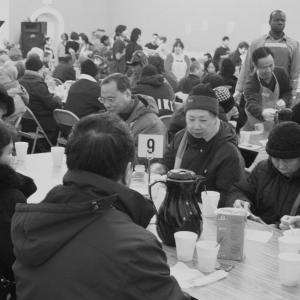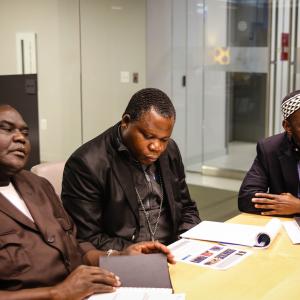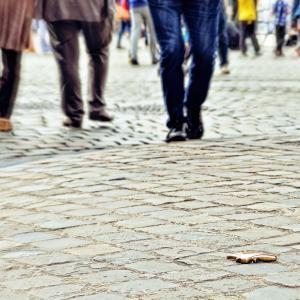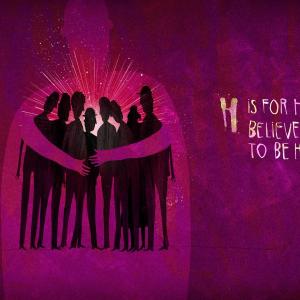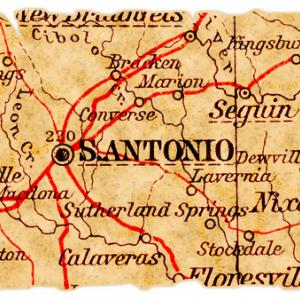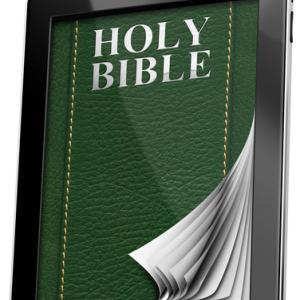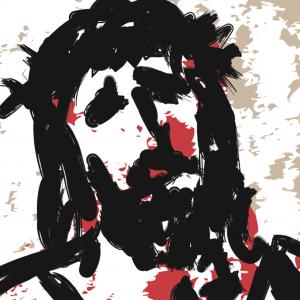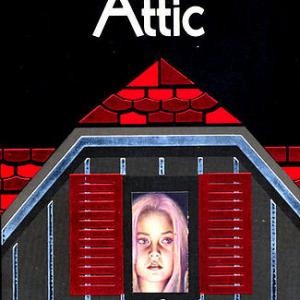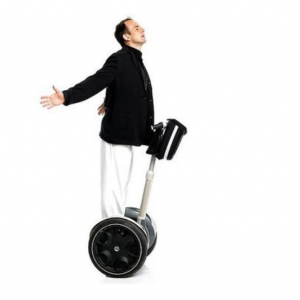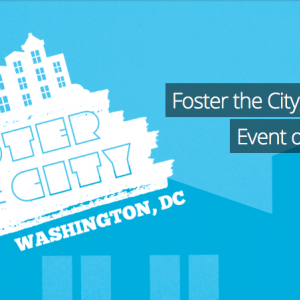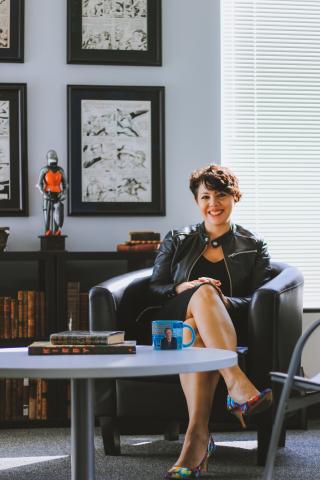
Juliet is a freelance writer and consultant and full-time mom. A transplant from New York City, she has lived in DC for over seven years, but still walks too fast and wears too much black.
Juliet holds a BA in media studies from Queens College (CUNY) and an MPA from the School of International and Public Affairs (SIPA) at Columbia University. She held jobs at the New York Times Syndicate, Redeemer Presbyterian Church, and Sojourners and the ONE Campaign before joining The Clapham Group as an affiliate and going out on her own as a freelancer. You can sometimes find her on Twitter or speed-walking with her son through Navy Yard and Capitol Hill.
Posts By This Author
This Is Jesus, in His Glory
"This will be a sign to you: You will find a baby wrapped in cloths and lying in a manger.” Luke 2:12
As the people walked into the sanctuary, the worship team behind us started to sing. “This is Jesus, in his glory.” I stood there in my apron, gloves, and hairnet — as I had many times before — and watched our guests sit down at their tables. The first few people who came in were elderly Chinese, more women than men. Then, a middle-aged Latino man came in, followed by a few more elderly Chinese women. For a brief moment, there reflected in their faces, was Jesus in his glory.
This past Saturday morning, I served at my parents’ non-profit’s soup kitchen and food pantry, as I had for half of my life before I moved to Washington, D.C. From 9:30am-11:00am every Saturday morning, unlimited breakfast is served to a range of New Yorkers: young, old, employed, unemployed, white, black, Chinese, Latino, gay, straight — you name it, we’ve got it. Our guests are seated and given all they can eat and a bag of groceries, as well as access to legal aid, GED and ESL classes, and prayer. As much as it pains me to admit it — because, well, it’s my parents’ work — it’s kind of the real deal. The sanctuary-turned-cafeteria turns back into a sanctuary as Jesus — as seen in each of these men and women and children—is seen, in his glory.
Central African Republic Faith Leaders Wage Holy Peace
“Since you are believers, I will speak to you as believers,” the archbishop told us, before explaining how he and his two colleagues — a Muslim imam and an evangelical pastor — have drawn on their faith in order to work for peace and reconciliation in Central African Republic (CAR). “If we want our hearts to be … like the heart of God, we need to learn to love other people, we need to learn to live in peace with them and to take them in. This is the only way we will be true children of God."
When the Seleka, a loose coalition of predominantly Muslim rebels, overturned CAR’s government in 2013, the anti-balaka, a loose coalition of predominantly Christian fighters, began to retaliate. At face value, the conflict seemed to be a religious one, event though Christians and Muslims in CAR have co-existed in relative peace for much of its 50-year history. Yet the twin forces of political instability and lack of economic opportunity have created an environment in which militias and rebel groups can prey upon young, unemployed men who see no hope for a future unless they fight for it.
Despite the chaos and conflict that have raged throughout CAR since March 2013, Dieudonné Nzapalainga, the Catholic Archbishop of Bangui, Imam Oumar Kobine Layama, President of the Central African Islamic Community, and Rev. Nicolas Guérékoyame-Gbangou, President of the Evangelical Alliance of the Central African Republic, have united to teach their flocks what it means to be “true children of God.” As news reports have focused on the violence and displacement of some 800,000 Central African Republicans, these three faith leaders have instead focused more deeply on what their faith traditions tell them is true. And that faith has propelled them to seek peace and reconciliation in their war-torn country.
For their work, the three leaders were jointly listed among TIME’s 100 Most Influential People in April and received an award from Search for Common Ground last week.
“When politicians wanted to use the religious fibers to divide the people, whether to maintain power or to conquer it, we stood up as if we were a single man to say ‘non’ to this war and ‘yes’ to peace,” the archbishop said in his acceptance speech.
The Measure of a Christian
We met over email in the spring of 2012. I had just co-launched a literary blog and our mutual friend introduced us as fellow writers. Stephanie and I immediately hit it off. Not only was she a gifted writer, Stephanie and I shared a similar sense of humor and sensibility. As we got to know each other and began to write with each other, we discovered a ridiculous number of similarities and common points of interest, including and especially, our shared Christian faith. To paraphrase C.S. Lewis, it was as though every other email was a “you too?” moment.
Then one day I wrote a piece that indicated my progressive political leaning. The 2012 presidential election was heating up and though the piece was not overtly political, it revealed my beliefs. Stephanie, it turned out, was a conservative.
This news wasn’t really a big deal to me — I am used to have friends and family who have different political beliefs, and I even got my first start in the blogging world as the token “progressive” Christian through a conservative friend’s blog. But things were getting heated with the election and we didn’t know each other that well.
Stephanie and I began to email back and forth about politics through the lens of faith, which tested whether we were Christians or ideologues first. We shared two things in common in holding our different political beliefs because: 1) we had both thought a lot about them, and, 2) shockingly, neither of us had an interest in destroying America. Eventually Stephanie and I decided to co-write a bipartisan series for our website, looking at partisanship through the lens of faith (summary: love for Jesus makes for fertile common ground).
After the election it was hard to ignore the mix of apocalyptic expressions of woe and the tone-deaf exclamations of victory. Each came with its own vilification of the other party. I found myself at parties with fellow progressives defending conservatives because the caricatures of them were plainly wrong, and I would be hurt if Stephanie didn’t defend me against caricatures of progressives.
A Shard of Hope: HBO’s 'The Leftovers' on Grief
As a native New Yorker, I can never forget Tuesday, September 11, 2001. I was in college, but heading to my part-time job that morning. My car was being fixed, so my father drove me to work. There was an unusual amount of traffic and as we turned on the radio, we heard a reporter talk about a plane that hit the World Trade Center.
The first thought we had was that this was an accident. It had to be an accident, right? As we listened to the reports though, the second plane hit and it was clear that something was very, horribly, terrifyingly wrong.
From our office in Queens, we watched the towers burn and then collapse. The image of the great cloud of smoke and debris encompassing the skyline has been burned on my brain. And a few days later, while handing out sandwiches to mourners at the makeshift memorial at Union Square with my parents’ church and non-profit organization, the feeling of hugging a total stranger while she wept on my shoulder will never leave me.
It is impossible to forget.
I must admit the timeliness on the part of HBO to air the season finale of The Leftovers in the week of 9/11. Tom Perotta, who authored the play on which the show is based, purposely included allusions to 9/11. Rather than a theological treatise on the Rapture, it is a beautiful case study in grief and the excruciating tension between the desire to move forward and the need to remember.
What 'The Leftovers' Can Teach Us About Hope and the Christian Faith
Editor's Note: Spoilers ahead! You've been warned.
Over the past eight episodes of The Leftovers, HBO’s latest drama based on Tom Perrotta’s play of the same name, viewers have been treated to a case study in grief and faith in the midst of a life-changing event. Unlike the Left Behind series, which incorporated Christian triumphalism with terrible theology, The Leftovers examines the deeper human and spiritual issues of what would happen were two percent of the population to suddenly disappear. It is powerful and beautiful and really hard to watch (especially Episode Five). It asks the question: does life go on when your world is changed forever?
The show offers a variety of responses to the Sudden Departure of October 14: Kevin Garvey, the police chief who seems to be losing his mind after his wife leaves him for a cult and after his father needs to be committed; Nora Durst, who’s lost her entire family, so she keeps everything exactly as it was when the Sudden Departure occurred; Rev. Matt Jamison, Nora’s brother whose faith has been shaken because he was not taken; the town dogs who have become feral; and finally, the creepiest citizens of Mapleton, the Guilty Remnant, or the GR as they’re “affectionately” known.
This past week’s episode gave us a greater understanding of the GR. Although the nihilistic views of the Guilty Remnant are quite different from those of Christianity, I was struck by their powerful and strategic mission of witness. The cult was formed out of the recognition that everything changed on October 14 and that to pretend otherwise was foolish. The group, in their white clothes, their silence, their stripped-down existence, bears witness to the fact that they are living reminders of what happened. They are fundamentalists about their cause and willing to die for it — even if that death comes from their own hands.
The Groan of All Creation: Come Lord Jesus
In these days barren fields will sprout trees
The deaf and blind will hear and see
The dead will raise and begin to breathe
The earth will groan in pain to see
The sons of God declare to be
His full and glorious family
The beautiful, perfect bride of Thee (Wash Me Clean, Page CXVI)
I am a city girl through and through — I’ve never lived outside of an urban context. Although my family lived in Queens (represent!), our church and community were in the dense and often treeless “ghetto” of Alphabet City, a neighborhood on the Lower East Side of Manhattan. My experiences of nature have mostly consisted of front and back yards, parks, and occasional trips to the beach or camping. And because I grew up in and spent most of my life in communities of the poor and marginalized, most of my experiences of God have centered around what Divine mercy, justice, healing, liberation, and restoration look like in the human heart.
In other words, it’s very easy for me to grasp the idea of a “New Jerusalem” or “a city whose architect and builder is God.” It’s easy for me to see the human component of God’s kingdom and what it means for people. It’s not so easy for me to imagine trees “clapping their hands” or even fully to appreciate the majesty of God’s handiwork in the stars ... because I’ve rarely seen a night sky free from light pollution. It’s not easy for me to imagine what a renewed creation would look like apart from new hearts and restored people.
Southern Baptist and Catholic Leaders Tour Texas Facilities for Migrant Children
Today leaders from the Southern Baptist Convention’s Ethics and Religious Liberty Commission (ERLC) and the Southern Baptists of Texas Convention will join the Catholic Bishop of Brownsville in Texas to visit two facilities for migrant children. This is not the first time evangelical and Catholic leaders have worked together on this particular issue—the United States Conference of Catholic Bishops held a joint press call with the Evangelical Immigration Table earlier this year and then together met with members of Congress in March.
The Clickbait Bible: New Testament
Ephesians: Can You Find All the Run-on Sentences in this Classic Book? Philippians: How To Build Your Endurance Using This Neat Old Trick. Colossians: You’ll Never Believe What God Looks Like!
What's So Good About Suffering?
A few weeks ago, my father was hospitalized for heart attack symptoms that might have been stroke symptoms that then turned out to be symptoms of something utterly inexplicable. My father, who suffered a massive heart attack in January 2009, and, against all odds and by the grace of God (he flat-lined twice), went on to survive subsequent surgeries and procedures and scares — always against all odds and by God’s grace. Though my father continues to survive and in many ways thrive, every hospitalization is a reminder that life is precious and short and tomorrow is not guaranteed to us.
This development has left me crying out to God, “Why? I know you don’t have to answer that, but … why?” This question reveals my heart: despite having known real and intense suffering in my life, I still live under the illusion that it is not normal. It’s been commonly reported, discussed, and parodied that those of us in the west, particularly in America, have no concept of how to deal with suffering. For many of us, even minor inconveniences — those “first world problems” like slow Internet access or traffic — feel like suffering in a relatively peaceful and easy world.
But as a Christian, I’m confronted by Scripture that reminds me that suffering will be part of our lives. And I’m confronted by the tendency — which I am sure that I share with many of my sisters and brothers — to shun it, preferring Gospels without suffering instead.
Broken Silence: Poll Shows Lack of Conversation on Domestic, Sexual Violence in Churches
If you made a short list of the issues the American church doesn’t talk about from the pulpit, you’d probably find sexual and domestic violence topping out the list.
According to a recent LifeWay Research poll of 1,000 Protestant pastors, 74 percent misjudge how prevalent sexual and domestic violence was within their congregations. Two out of three pastors reported delivering a sermon once a year (or less) on the issue. And although 72 percent of pastors speak out on the issue because they believe sexual and domestic violence is a problem in their local communities, only 25 percent do so because they perceive it to be a problem in their congregations. The poll was conducted on behalf of Sojourners and IMA World Health and the full report can be found here.

An Occupied Cross Before an Empty Tomb
I used to hate Good Friday. Jesus dying a gruesome and unjust death didn’t seem particularly “good” to me. Even now, when I watch a Jesus movie like The Greatest Story Ever Told (or let’s be real: Jesus Christ Superstar), I find myself secretly hoping that someone in the crowd will say “wait a second! Just four days ago we really liked this guy. Crucifixion is a terrible idea, let’s go have Passover.” Mic drop.
The idealist and optimist in me would prefer to be reminded that the cross was empty, that Jesus was alive, to focus less on Good Friday and more on Easter Sunday. But I have come to appreciate the image of Christ on the cross much more now that I’m an adult and there are things that I have said and done in my life that deserve a reckoning. Jesus is there, gladly bearing my sin on the cross.
I’ve come to appreciate that there are so many broken and twisted places in this world that need a Redeemer. And Jesus is there, undoing the power of sin and evil on the cross.
Pride: It's All About Who You Know
Let those who boast, boast in this, that they understand and know me, that I am the Lord; I act with steadfast love, justice, and righteousness in the earth, for in these things I delight, says the Lord.” (Jeremiah 9:24, NRSV)
Pride has taken many forms in my life, but most dangerously in this: I have taken myself far too seriously. You wouldn’t think that a neurotic worrier who spent eight years in therapy would be full of pride. But for years I was utterly consumed with anxiety over what would happen in my life, because I believed that it should go a certain way and that I had both the responsibility and ability to bring that about.
So there’s nothing like having your worst fear come true — 19 months* of unemployment in a bad economy — to show you how small you really are, especially compared to God.
It was kind of amazing.
All of Life is Repentance, But Especially Today
Seven years ago this week, I had my “come to Jesus” moment.
That’s not to say that over the past few years I haven’t had many experiences in which I’ve come away wondering “did I ever really believe up until now?” Many of those moments were far more profound and life-changing. It’s just that for me, it’s where a certain chapter of my life began.
I was raised in a Christian tradition that prized altar calls and bowing your heads, closing your eyes, and raising your hands to be saved. There was a clear delineator of when you were “born again” and when you were not. It was a moment in history, not just a spiritual exercise.
I don’t totally disagree. I think that there is something significant about the moment you first say yes, the same way I can remember the first time my best friend and I stopped just being colleagues. Our friendship has had many more important moments, but going to see Alice in Wonderland after work on a rainy Monday evening in March was where it started.
But as I have persisted (persevered for you Calvinists) in this faith I’ve discovered more and more what a relationship with God is like. In order for it to work, as Martin Luther famously said, all of life must be repentance. Every day the choice to say “yes” and not “no, I’m so done with this” is just as significant, if not more because coming to Jesus is often easier than staying.
'Flowers in the Attic' and Women on the Brink
(Spoiler—and imperfect analogy — alert to anyone who wasn’t able to sneak these books when they were pre-teens)
If there was one book series that defined my childhood/pre-adolescence, it would be V.C. Andrews’ Flowers in the Attic series. OK, maybe that wasn’t THE book series—after all, there were the Baby-sitters Club books and Sweet Valley High—but in terms of helping to destroy what little innocence I still had, Flowers in the Attic gets top ranking. I mean, I probably didn’t need to be reading books about incest, child abuse, and religious fanaticism when I was 10 years old. But that’s a story for another time.
The Lifetime network has made a film version of Flowers in the Attic that will debut on Saturday night. In anticipation of the remake, I decided to watch the 1987 version starring Kristy Swanson. Besides being struck by how dated it was — think fuzzy lighting, a lot of beiges and pastels, and 80s bangs — the premise seemed outdated even for that time. A recently widowed stay-at-home mother of four finds herself unable to care for her family and must return to her wealthy, estranged parents and beg to get back into her dying father’s good graces (and will). As a condition of her return, she must consent to have her four children locked in the attic and subjected to her mother’s abuse and neglect.
I sometimes forget how much the world has changed in such a short period of time.
As I Walk Through the Sudden Valley: A Psalm, a Prayer
Author’s note: If you know me, you’d know that that I think the most important thing (of the things we worship ) is Jesus. And you’d also know that I love Arrested Development, with almost the same type of devotion I typically reserve for God. As a former “professional church lady,” crafting prayers was right in my wheelhouse. So I’ve composed a psalm entirely out of Arrested Development quotes based on the ACTS style of prayer, because it is right, and a good and joyful thing, always and everywhere to give thanks to God. And also … not Aunt Lindsay’s nose.
Oh God. (AD 2:13)
I love you. (AD 1:7)
We all must seek forgiveness. I’ve always tried to lead a clean life. My brother and I were like those Biblical brothers, Gallant and, um … Goofuth. (AD 2:14)
Foster Care for a New Millennium
I WAS 7 years old when my family first opened our home to foster children. My parents were in their early 40s and already had four children at home. They were somewhat typical for foster parents at that time: married, established, often people of faith. We had a total of 10 children in our home—two of whom were adopted—from 1988 until 1997. Fostering children was a 24-hours-a-day, seven-days-a-week commitment and calling. As my mother would say, “God sets the lonely in families—but am I willing to let him set them in mine?”
This is a question that more Christians—particularly the oft-maligned Millennials—are asking themselves. They are examining both the sheer number of children growing up without families and scripture to see what it says about their faith. Taking their cue, and often their names, from James 1:27 (“look after orphans and widows in their distress”), groups in Colorado, Arizona, Oklahoma, Virginia, and most recently the District of Columbia have committed to looking after these modern-day “orphans in their distress.”
According to the Administration for Children and Families, in 2012 there were 400,000 children in foster care nationwide. Of that number, 102,000 were waiting to be adopted. Only 52,000 children were adopted in 2012; at the end of 2011, 15 percent of youth in the system lived in group homes or institutions. What is most troub-ling is the number of youth who “age out” of the system every year without the support of a family. At the end of 2011, 11 percent, or 26,000 youth in the system, aged out. These youth are much more likely to experience homelessness, health problems, unemployment, incarceration, and other trouble later in life.
Stop Living Every Day Like It's Snark Week
I love talking. According to my mother, I started making babbling noises at three weeks old and haven’t really stopped since. I love words and I love to use them — particularly in writing, tweeting, or delivering a well-timed rejoinder or witty remark.
But it’s shockingly easy to go from a pithy pun to a snarky statement — and I’ll admit that I end up cutting people down far too often.
I used to not care about this so much. Growing up in the church — particularly as the daughter of two pastors — the constant earnestness and cheesy Christian culture was so ripe for commentary. As a 9-year-old, I refused to attend “Superchurch,” our program for children because I thought it was too lame and when it came to stuff like Psalty and Charity Church Mouse, I just can’t even finish this sentence without writing something sarcastic.
Over time, one of the biggest obstacles toward embracing Christ was that I just didn’t want to be a Christian. I couldn’t see the appeal for a variety of reasons, but in particular, it seemed to involve a lot of smiling, emotional vulnerability, and being sweet — all of which made me uncomfortable. The irony here is that I’m actually a very smiley, emotionally vulnerable, and maybe not sweet, but warm person, so yes, Dr. Freud, snark is a defense mechanism.
A Year of Living Beth Moore-ishly
I think what turned me off the most was the hair. It was just so ... big. And the scrappy “don’t mess with Texas” vibe. And the fact that evangelical moms all over the country were fans. As a third generation New Yorker, cynicism and snark have been bred into me, along with an affinity for black clothing and pretentious coffee. So it has surprised everyone — including me — that I have spent the past year going through (and recommending) Beth Moore studies.
How did it happen? Well, I moved from my hometown of New York City to Washington, D.C., and while I was exploring various employment opportunities, I had a lot of free time. The wife of the former associate pastor at the church I’d started attending invited me to join a “women’s Bible study” that met on Friday mornings. They were doing a Beth Moore study called Breaking Free. It seemed fishy to me — who are the only women who have free time on Friday mornings? Moms. And Beth Moore? I had spent six years attending and four years on staff at a church in New York that got super famous because of its own rockstar, hyper-intellectual, and somewhat post-modern teaching. We prided ourselves on not being ... well, like Beth Moore.
Still, I was trying to be open to life in my new city so ...
I walked into the group a couple of minutes late wearing gold sequin pumps, skinny jeans, and a red leather jacket — what I would normally wear to bum around town in my old life. I could not have been more out of place amidst the yoga pants and baby blankets. But I met some of the most awesome women I’ve known in D.C. and more importantly — I met Beth.
DC127: Fostering a Better City
"Foster care touches on multiple issues and engaging the system is a way to comprehensively engage some of the biggest challenges to a city’s flourishing."
There is a new initiative in Washington, D.C. that hopes to so profoundly change the foster care system in the city that the supply of foster homes will far exceed the demand for them. DC127 is an organization committed to “reversing the list” of children and youth who are waiting for a foster or adoptive home. By reminding churches of the biblical mandate to care for widows and orphans, they have started a network in D.C. that spans Christian denominational lines.
The movement is beginning to gain some traction and DC127 is gearing up for its first event on November 2.
